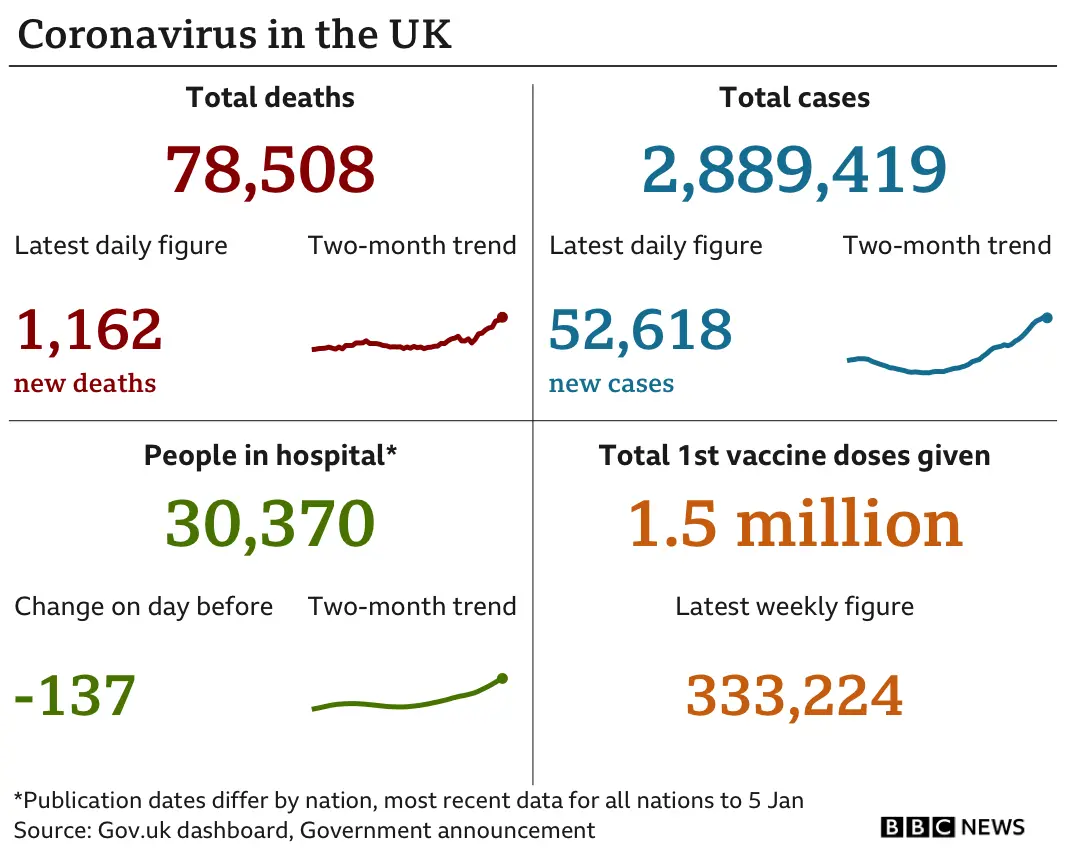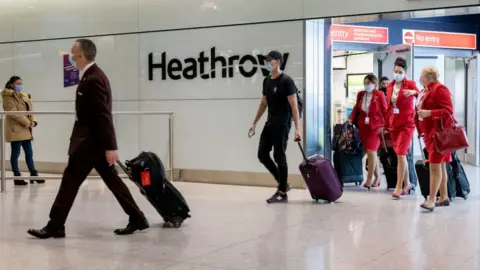Covid-19: Travellers to UK will need to show negative test result
All international passengers will soon have to test negative for Covid-19 before travelling to the UK.
People arriving by plane, train or boat, including UK nationals, will have to take a test up to 72 hours before leaving the country they are in.
Transport Secretary Grant Shapps said travellers "can't board... without having that negative test".
But even with a negative test, arrivals from countries not on the travel corridor list must still quarantine.
Mr Shapps said the government was "very keen" to set up compulsory testing now because of the new variant of the virus circulating in South Africa, which he said was "causing great concern with the scientists".
"They're not sure whether, for example, the vaccine will be able to deal with it in the first place, and we're very, very keen to keep it out," he told BBC Breakfast.
The new variant prevalent in South Africa has got some potentially concerning changes that experts are closely monitoring. While it is extremely unlikely the mutations would render vaccines useless, scientists are doing tests to make sure immunisation will still work well.
Even in the worst case scenario, vaccines can be redesigned and tweaked in a matter of weeks or months to be a better match if necessary, experts say.
It comes after a further 1,162 deaths within 28 days of a positive test were reported in the UK on Thursday - the second consecutive day of more than 1,000 recorded fatalities. There were also 52,618 new cases.
The R number - the average number of people that one infected person will infect - is now between one and 1.4, scientists have estimated.
Amid the surge in cases, Prime Minister Boris Johnson has pledged to offer "hundreds of thousands" of Covid vaccines per day in England by 15 January. On Friday, a third vaccine - made by Moderna - was approved for use in the UK.

Under the new rules - which are expected to come in from next week - anyone who arrives in the UK and has not got proof of a negative test could face an immediate £500 fine.
But there will be exemptions for:
- children under 11
- hauliers
- those travelling from countries without the infrastructure to deliver tests - although details of those have not been released yet
- arrivals from the Common Travel Area with Ireland.
All passengers arriving from countries not on the government's travel corridor list must still self-isolate for 10 days, regardless of their test result.
Mr Shapps told LBC the testing rule will come into force "likely on Wednesday or Thursday next week", and details of how to get tests abroad will be published on the gov.uk website.
The rule will be UK-wide, although Northern Ireland said it had only "agreed in principle" and was working to solve any policy and operational issues.
Non-essential travel abroad is not currently allowed in the UK, after lockdowns were brought in.

'So much for an idyllic holiday'
 EPA
EPA"All in all, the thought of an idyllic holiday 'away from it all' has been about as far from the truth as possible," says Rob Howard, who is is currently on holiday in Tenerife.
He flew out before Christmas and - after deciding to extend his holiday by a week and rebooking a cancelled flight - is due to fly back next Wednesday.
Reacting to the news that he will now likely need to take a Covid test before travelling, Rob, from Nuneaton, says: "We are going to be expected to self isolate for 10 days so what is the point of this?"
Meanwhile, freelance MOT tester Matthew Auty, who lives in Normandy in France but works in Portsmouth during the week, says he's unhappy about the potential cost.
"These restrictions are reasonable for tourist travel but they are unfair for people in my position," he says.

Figures from the aviation industry have urged the government to lift the rules as quickly as possible.
"This measure will destroy any confidence in forward bookings for air travel and for ferries, and it will essentially close off the UK," said Ryanair chief Michael O'Leary.
He called for the government to set an "end date" for the rules, adding: "The real solution to this is vaccination, not artificial travel restrictions.
"Boris Johnson has told us he will have vaccinated the 14 million high risk categories by the middle of February. What we need Grant Shapps to do today is confirm then that this ridiculous pre-arrival testing will then be removed by the middle of February."
The boss of Heathrow, John Holland-Kaye, said of the rule: "If this will help, then so be it."
But he called it a "really belt and braces approach", adding: "We have always argued for pre-departure testing as an alternative to quarantine... now we're going to have both".
"And it can only be a temporary measure, very few people will travel with this in place," he added to BBC Radio 4's Today programme.
 Getty Images
Getty ImagesTim Alderslade, the chief executive of the industry body Airlines UK, said the move should be "a short-term, emergency measure only".
"Once the rollout of the vaccine accelerates, the focus must be on returning travel to normal as quickly as possible", he added, including "removing the need to quarantine or test".
Labour's shadow home secretary Nick Thomas-Symonds said the new measures were "necessary" but highlighted that the opposition party "has been calling for a comprehensive strategy on testing for international travel since April".

- LOCKDOWN LOOK-UP: The rules in your area
- TESTING: How do I get a virus test?
- SYMPTOMS: What are they and how to guard against them?
- LOOK-UP TOOL: How many cases in your area?

It comes after England banned travellers from countries near South Africa to stop the spread of the new local Covid variant.
The latest travel curbs come as all of the UK is under strict Covid rules, with lockdowns in England, Wales, Northern Ireland and most of Scotland - meaning there is very little international travel.
At a Downing Street press conference on Thursday, the prime minister confirmed almost 1.5 million people in the UK had now received at least one dose of a Covid vaccine, but warned there would likely be "lumpiness and bumpiness" as the rollout continued.
The government has set a target to offer vaccination slots to the top four priority groups - including all over-80s - by 15 February.

Are you currently abroad? How will this affect your plans? Email [email protected].
- WhatsApp: +44 7756 165803
- Tweet: @BBC_HaveYourSay
- Please read our terms & conditions and privacy policy
Or use this form to get in touch:
If you are reading this page and can't see the form you will need to visit the mobile version of the BBC website to submit your comment or send it via email to [email protected]. Please include your name, age and location with any comment you send in.

